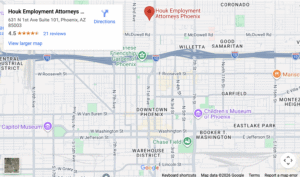
The state of Arizona protects disabled employees, but you may still wonder whether an employer can ask you for proof of your disability. Typically, your employer should only request confirmation of a disability when they are arranging reasonable accommodations. However, concerns about workplace discrimination may arise when these requests overstep legal boundaries.
Coping with a disability can be a stressful experience, especially when you worry that it might impact your job. This article will explore the legal limits of employer inquiries, your rights as a disabled employee, and what to do if you feel your privacy has been violated.
A Prospective Employer May Not Ask You About Disabilities Prior to Employment
An employer may not discuss anything about your health or possible disability during an interview. Using information about your disability status to make a hiring decision is discrimination. However, they may ask if you can perform essential tasks for the job, such as standing for extended periods or lifting items of a certain weight.
Further, you are not obligated to disclose your disability at the time of an interview. When you are hired, your employer may ask if you require any accommodations to perform your job duties. If you have an existing condition that requires accommodations, this might be a good time to discuss it.
The process of implementing these accommodations should be an equal exchange where your employer makes an effort to understand and accommodate your specific needs.
Your Employer Is Legally Allowed to Ask About Disabilities in Specific Contexts
Generally speaking, any disability you may have should not be the topic of conversation with your employer unless or until you request accommodations. According to the Americans with Disabilities Act, your employer is required to provide reasonable accommodations for a documented and applicable disability, or if you are requesting leave through the Family Medical Leave Act.
Proof of Disability Does Not Mean Medical Records
Suppose you are in a situation that requires you to provide proof of your disability. In that case, this does not mean you are obligated to provide your medical records or sign a release of information for your employer to communicate with your doctors.
In most circumstances, your physician will fill out a form that simply states your diagnosis based on their assessment and a short explanation of the accommodations you may need to perform your duties. For FMLA, they may indicate limitations to your ability to perform your job duties or the amount of time you should be out of work to deal with your condition.
Your Information Should Stay Private
Should you provide proof of disability, physician letters, or any other form of personal information, your employer is obligated to keep the information private and confidential. If your information has been exposed, they must notify you per Arizona data breach laws.
Can Your Employer Deny Reasonable Accommodations?
In many situations, employers will provide reasonable accommodations without much issue, though they may request more formal documentation for invisible disabilities or before making more extensive accommodations beyond a schedule adjustment or preferred seating.
Some of the reasons your employer may deny your request include:
- The accommodation poses a safety risk to others
- The accommodation would cost the business more than it would bring in
- Making the accommodations would disrupt day-to-day business
- The accommodations would have an ongoing effect on the quality of the product or the ability to deliver
If you provide the appropriate documentation from your physician to support your needs, your employer cannot deny your request without a valid reason.
Contact Houk Employment Attorneys for a Confidential Consultation
If you are a disabled worker in Arizona, you are protected by anti-discrimination laws to ensure you have fair and equal opportunities for success. Your employer should only request information regarding your disability in good faith and to provide reasonable accommodations.
If you think your rights have been violated, contact Houk Employment Attorneys for a confidential consultation with an Arizona employment lawyer.
Houk Employment Attorneys
631 N 1st Ave Suite 101, Phoenix, AZ 85003
(480) 569-2377

